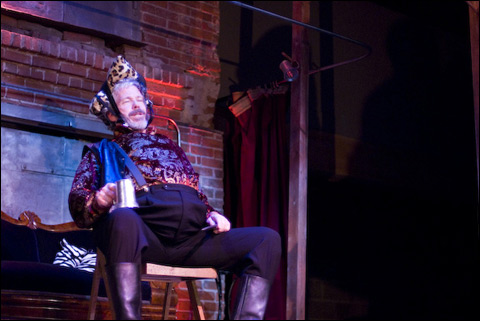
CONCEPT CRISIS: Trying to insert the “facts” of Richard II into Henry IV doesn’t work. |
The work of Actors' Shakespeare Project is generally smart and imaginative, so the company's thoroughly misbegotten Henry IV, Part I, the first half of ASP's The Coveted Crown (at Midway Studios through November 21), comes as a surprise. Patrick Swanson's production begins with what the program calls a prologue from Richard II that parallels Bolingbroke's usurpation of Richard's crown (an act that turns him into King Henry IV) with Worcester's rebellion toward the end of Henry's reign — a rebellion that Henry's army, with prodigal son Hal at its head, spends at least half of the two parts of Henry IV putting down. The problem is that the prologue runs nearly half an hour and includes extracts from four separate scenes from Richard II. That's overkill — and a challenge ASP isn't prepared to meet. The Richard interpolations are wobbly and unconvincing, and Marya Lowry, cross-gender-cast as the doomed king, is so lost in the role that she seems to be swimming in it. She's better as Worcester, though Swanson's idea to cast the same actor in both roles to suggest that the ghost of Henry's past is coming back to haunt him works only if you don't think too hard about how Shakespeare presents Henry — as a chastened Christian ruler converted by Richard's fate.
Henry IV, Part I is such a marvelous coming-of-age play that it usually works on some level, but this version has been miscast almost straight down the line. Bill Barclay's Hal lacks charm and in his early scenes seems almost sinister; his reading of the great soliloquy that ends "I'll so offend to make offense a skill/Redeeming time when men think least I will" is closer in tone to Edmund's rejoicing in his own villainy in Lear than to the promise of a dissolute young prince to show his noble colors at last. Allyn Burrows, ASP's artistic director, is a good decade and a half too old to pull off the prince's opposite number, Hotspur, whom his uncle Worcester's rebellion, if it succeeds, will put on the throne in place of Hal. Burrows was first-rate as Timon of Athens last season, but here he seems perversely wrong. So do Sarah Newhouse as his wife, Lady Percy (they might have stepped out of a 1950s sit-com), and Bobbie Steinbach, ludicrously costumed, as the innkeeper Mistress Quickly. (The program lists no designers, which is unfortunate, because the best thing about the show is the lighting.)
As Falstaff, the companion of the prince's misspent youth, Robert Walsh gets his laughs, but his merriness feels put on, like his fat suit: he doesn't move like a man of Falstaff's bulk. In the play's scheme, he and the king are foils just as Hal and Hotspur are — they're Hal's two fathers, one for holidays, one for every day. Joel Colodner fares better than most of the ensemble as Henry, but whereas Burrows is too old for Hotspur, Colodner is too young. Here, though, the trouble isn't miscasting. By introducing Henry as the Bolingbroke of Richard II, Swanson has no choice but to cast an actor whom we can believe as a warrior rebel, strong enough to seize Richard's throne. But when he moves from Richard II to Henry IV, Shakespeare ages Henry. It's theatrical sleight of hand: in a brand-new play, we don't mind that the 40ish king who complains of his "unthrifty son" has become a 60ish king who dies at the end of Part II not in battle but of old age. You can't just impose a concept on Henry IV; you have to think it through.